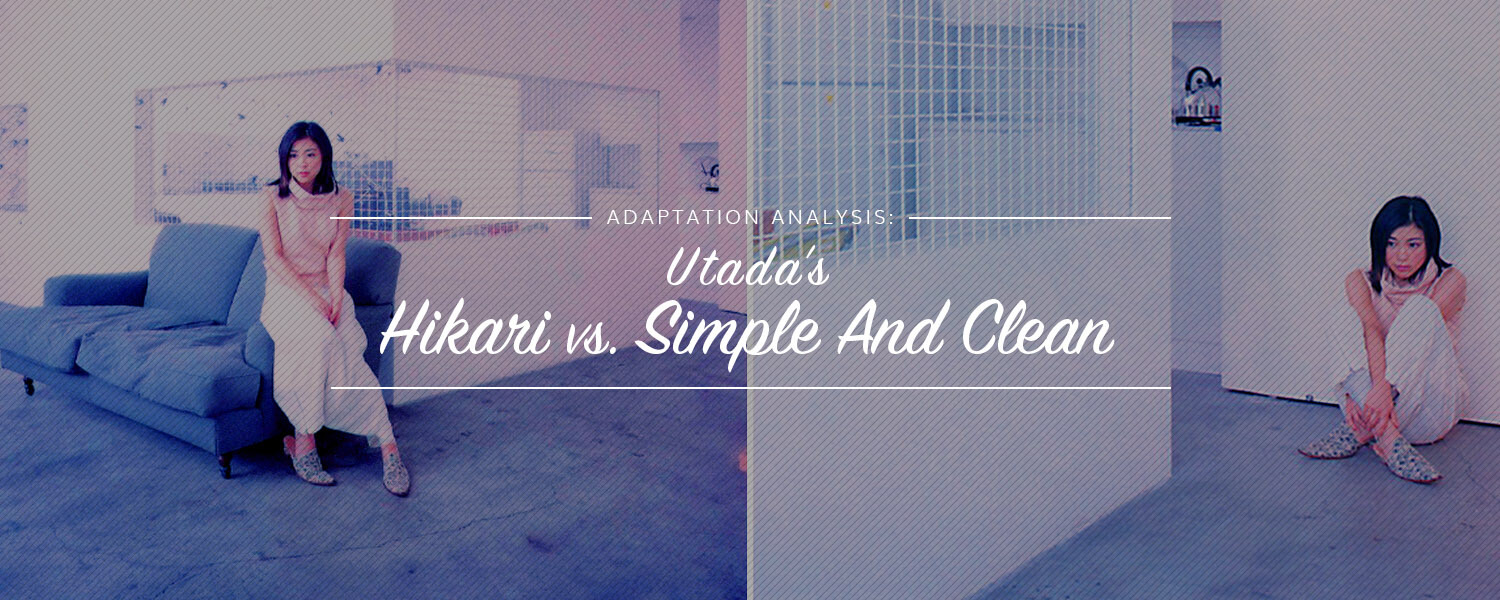Utada Hikaru is one of my favorite artists. Her songs encompass numerous genres while still retaining the details that make her sound unique. I can remember very clearly the first time I heard her sing: my sister and I were watching television, and a commercial came on for the game Kingdom Heart’s: Chain of Memories. The minute the song played, I paid attention to the screen. I saw that commercial so many times that at some point I was able to notice in the corner of the screen the name of the singer who had utterly enchanted me: Utada Hikaru. My sister and I may not have know much about the game, but we knew those lyrics by heart. While I’ve grown to love a lot of music from Japan and elsewhere, Utada’s remains extremely close to my heart.
Over time, I decided that one of my life goals would be to learn Japanese. It has most certainly been a difficult and long journey, but little by little I’ve been able to understand bits of songs I listen to or text I come across. As I studied, I thought more and more about “Hikari,” the original, Japanese-language version of “Simple And Clean.” There was something about it that seemed different from its English counterpart, and in the back of my mind I made a note to look into the lyrics once I became more fluent in Japanese. While I still have a lot to learn, I feel a little more comfortable in trying to assess both songs side by side. I have translated the lyrics to “Hikari” as best as I can, and while it may not be a perfect translation, I will be using it as the basis for this comparison. The lyrics for “Simple And Clean” are from the gameplay manual to Kingdom Hearts.
A quick note before we begin: one of the difficulties that I had while translating “Hikari” was figuring out what to do with te-form verbs (which could denote either a sentence with two clauses (translated as “and”) or a casual request). The final translation I came up with in those instances plays along with my own interpretation of what the song is about, though if I felt a double-meaning was likely, I mentioned it.
Opening Chorus
Both songs begin with the chorus: “Hikari” follows the melody of the chorus, while “Simple And Clean” uses the chorus found throughout the song. One of the major differences between the two songs is how they incorporate their subtleties; “Hikari” contains a lot of imagery, while “Simple And Clean” focuses more on double-meaning and nuance within its more conversational structure. “Hikari” begins with the narrator declaring utter loneliness: “No matter when it is / I’m all alone.” The song itself sounds upbeat instrumentally, so these are curious words to start with. The last phrase of the next two lines in Japanese is noni, which can mean “despite” or “even though.” Because it comes at the end of the sentence and doesn’t really make sense with the rest of the lyrics, though, it’s likely a different noni: in casual speech, it implies a feeling of frustration. She feels totally alone, perhaps because she can’t stop thinking about her fate, whatever that may be. “Carry on living” implies that her thoughts are interfering with her day-to-day life, acting as a major detractor. The final two lines involve both lightness and darkness: she awakens, or literally “opens her eyes” because of the appearance of a sudden light; however, it’s in the middle of the night (or midnight). This could mean a few things. Her lover is the “sudden light” that has entered her life, and when she opens her eyes it’s already dark again, denoting a fleeting presence. It could also mean that he appeared at her darkest point, represented by the darkness of midnight. We’ll keep these two ideas in mind as we continue to look at the song.
“Simple And Clean” starts off a little differently, presenting a parting between two lovers. It’s written as “walk,” putting it in the present tense. This is possibly a common occurrence: perhaps she isn’t referring to a final parting, but situations in which he is the one to leave first. Her lover is the one parting, and as he walks away, he doesn’t hear her say “please / Oh baby, don’t go.” This can be taken a couple of ways: one is that he leaves so soon that he doesn’t even hear her try and call him back, perhaps to try and rectify the situation, perhaps to try and make him understand her; the other is that he doesn’t hear those things because she doesn’t say them. It’s possible that she’s unwilling to say those things, either because she has negative feelings towards him or because she doesn’t want to admit to the desire to call him back. This is followed by “Simple and clean is the way that you’re making me feel tonight.” What does she mean by “simple and clean”? Knowing how the rest of the song goes, “simple” could refer to intelligence: perhaps he acts in a way that makes it seem as if he’s intellectually superior to her, making her feel foolish. But what about “clean”? Perhaps he leaves her feeling clean of his love: if he’s not staying long enough to hear her pleas or she’s not willing to say them to him, there’s a lack of expression regarding their affection for one another. Finally, our narrator says “It’s hard to let it go.” What does that second “it” refer to? The feeling of being “simple and clean”? Her own perceptions of how he views her? Their relationship? This will be something to keep in mind as we look at the rest of the lyrics later on.
Comparing the two, “Hikari” is potentially a little more hopeful, while “Simple And Clean” indicates a sadder situation between two people. The narrator of “Hikari” seems frustrated with herself, whereas the narrator for “Simple And Clean” may be frustrated with the other person more so than herself, though the last line could indicate otherwise.
Verse 1
This was one of those moments when I wasn’t sure if the te-form meant the narrator wants the other person to do these things or if she was the one doing them. Thus, we can look at both possibilities. What does it mean if she wants him to quietly stand by the exit and take the light in the dark? Considering that throughout the song she refers to him as being “the light,” it wouldn’t make sense in terms of continuity. However, if she’s speaking of her own actions, then these two lines can be seen as a continuation from the opening verse. The light is in the darkness, which is where she is when she first encounters him. Now, here she is in that same darkness, taking him into her life. “Quietly standing in the exit” may mean that she’s at the “exit” of her own personal darkness upon seeing him. By taking the light, she’ll move through the exit and hopefully leave that darkness behind. One interesting note is the word “take” in this instance: the Japanese verb used is uru in its te-form as ute. Uru, as in “to attain” is usually pronounced as eru and written with this kanji: 得. In her lyric book, though, it is written with the kanji 撃 (read as u in the verb utsu), which means “attack.” Why use the kanji for “attack” when the narrator is accepting someone she sees as a light into her life? Does this indicate a difficulty between the two people coming together, perhaps that her acceptance wasn’t an easy one? Maybe the presence of this kanji acts as an indication of things to come.
The first line of this verse for “Simple And Clean” has the narrator say that her lover is giving her too many things; he’s focusing on showing his affection through money and what he can give her in that regard. In other words, his focus is to provide her with worldly things. Putting the word “lately” at the beginning of the second line is significant: placing it at the end of the first line would suggest that he’s only recently been buying too many unnecessary things for her. Instead, it’s her need for him that has grown. Perhaps something happened between the two that has made her desire nothing but him, a maturing of feelings beyond the more shallow benefits of being in a relationship. She could also be referring to needing him in a more physical sense, such as spending time with him. Him smiling at her shows his warm feelings towards her, but the line ends before we know what he said. Breaking it off here represents the disparity that seems to be plaguing the couple from the opening verse.
With “Hikari,” the relationship between the two is still new, since she is only standing in the exit of her current situation. In “Simple And Clean,” though, the relationship seems to be one that has been going on for some time, which is indicated by her acknowledging her own changed feelings.
Bridge 1
The first line in this section of “Hikari” is a little tricky. It involves the Japanese verb saseru, which means “to make or allow someone to do something.” The question is, who is being made to feel anxious? The three possibilities are her, her lover, or people in general. The key to figuring that out lies in the second line: “I only want to voice my desires.” If that’s what she wants, then something must be holding her back. Her own anxiousness could do that, but that second line ends in the particle sa in the original Japanese, which indicates assertion. Thus, it makes sense for her to be addressing someone, in this case, her lover. “These days” makes it seem like time has already passed for the two since the end of the first verse. Now, going back to sa, it should be noted that it’s more typical of men to use it in speech than women. Could her lover be speaking in this line? It’s not impossible: if he’s being made anxious, then he would want to mention the things he wants out of their relationship. She could also still be the speaker, though, indicating that she feels strongly about voicing her desires. The third line also ends in a particle, yo, which gives off a sense of informing someone of something or asserting something. Both the second and third line have particles of assertion, so either the two are butting heads over something, or the narrator is giving her side of the dilemma. What she seems to want is to introduce him to her family, and whether he directly says something or it’s indicated passively, there’s a sense that this desire is met with resistance. That desire is likely just one of a few: the particle nimo is used, which means “also.” So, among other things she wants him to meet her family. The final line also ends with the yo particle, having her emphasize that she thinks things will likely go well between the two parties. She probably does this to reassure him.
Whereas “Hikari” likely sticks to one perspective in this section, “Simple And Clean” solidly gives her lover’s point of view. We left off with him about to tell her something, and he spends the whole bridge talking. He begins with “Don’t get me wrong I love you.” It’s a line that tries to reassure her, but the way it’s phrased already suggests there’s a catch to that. The following line brings that catch to the forefront: “But does that mean I have to meet your father?” Meeting the parents is a sign of commitment, typically with the expectation of marriage or that the person will be a part of your life for a long time. Her lover wants to know if he can forgo that, instead of requesting to put it off. The line before this is rather casual, and we already know he expresses his affection with things. Thus, this likely indicates a current lack of interest in progressing their relationship to that kind of commitment. However, because he doesn’t add “yet” or “now,” it leads me to wonder if he has any desire to actually reach that point, or if their current state is the one he’s most comfortable with. The third line is reminiscent of something a parent might say: “you’ll know when you’re older” or “wait until you’re older.” He includes himself in the statement by saying “we,” which could indicate that he does want to be with her for the long-term, but his phrasing puts him in a superior position to her: it’s she who will understand something he already knows. There definitely seems to be a perceived “wiseness” gap, whether he means to assert that or not. The split between the last two lines is significant, since it puts forth a double-meaning: from his perspective, he feels that things aren’t as easy as “you’ll meet my father and get along, and we’ll build a happy life together.” He may be thinking of all the complications that could come up along the way. In turn, by separating “no” from the rest of his quote, it becomes two different sentences: he says “no,” and she thinks it isn’t as simple as him refusing to meet her father, since that choice complicates their relationship and shows the difference in their level of commitment to one another.
Both songs have the main narrator wanting her lover to meet members of her family, and they both indicate similar levels of commitment. While “Hikari” alludes to her lover not quite wanting to and feeling anxious about it, he states his opposing desire pretty clearly in “Simple And Clean.” There’s more of a back-and-forth between the two in “Simple And Clean,” and even though she is the one relaying what he’s said, the song does provide him with a voice. “Hikari” seems to be her point of view, and perhaps she incorporates his reactions into what she says. A big difference seems to be the nature of the relationships: while both at this point have questioning lovers, we don’t really know how he feels about her in “Hikari.” She sees him as her light, but in “Simple And Clean,” that positive image isn’t there. He makes her feel negative things about herself, which makes their relationship even more complicated.
Chorus 1
The chorus here strongly gives the narrator’s perspective on their relationship: she seems to be looking at their past and trying to keep it in their present. The first chorus for “Hikari” has her finding “the light” in the middle of the night. She begins by saying that no matter the time, it’s always been the two of them together, perhaps referring to both difficult and easy moments. The next line, soba ni iru kara, has two possible translations: “you are by my side because…” or “I am by your side because…” Considering the next line mentions him finding her, along with the image of light being attached to him, it makes sense that she wants to assert that she’ll be beside him. Now, why will she be beside him? Because he finds her “in the middle of the night.” Maybe he continues to reassure her during difficult times in her life or their life together, but the chorus purposefully calls back to the one that opened the song. Is she possibly hanging onto that idea of him as a “light,” which ends up blinding her to the issues before her? Not really, since she recognizes that he might be anxious in the section before this one. What may be the case is that she’s sees him in this way and is so certain about his importance in her life that she’s blinded to the possibility of their relationship failing. “Finds” is written in the present tense, but the verb mitsukeru can mean “finds” as well as “will find.” Thus, she may feel that he will continue to be her “light.”
“Simple And Clean” repeats the chorus that opens the song. Though it repeats, we have a better understanding of their relationship. “When you walk away … don’t go” could in fact represent her response to confrontations between the two of them. Before, they “argue” about him meeting her father, and her response could be to just let him move on from the conversation and not press the matter further, whether she wants to or not. One reason he doesn’t hear her say “don’t go” is because she doesn’t try to make him hear her. With only his words seeming to be the final say in the matter, his wishes are granted. The line “When we are older” makes her feel “simple,” and “clean” in this context could mean that she feels clean of being assertive, almost as if she’s conforming more to what he wants while her own desires lose out on being fulfilled. Her negative perception of the incident may be difficult for her to let go, or maybe it’s difficult for her to put the argument out of her mind.
“Hikari” here seems hopeful of the couple’s relationship by looking at past happiness and inserting that into their present and future, while “Simple And Clean” forces the narrator to contemplate on the here-and-now and the difficulties that persist.
Verse 2
Once again, the Japanese here uses the te-form, as well as a te-form equivalent found in the written language. Either she is entering onto the street or she wants him to do so. That would mean that it is either her or him who ends up removing “destiny’s mask.” Does she want him to be reassured about their future, or does she need the reassurance? Both seem quite possible. This is one of those moments that I came back to after looking over the rest of the song. Doing so made me wonder if all those moments in which she may be requesting something of him are actually her talking to herself. This comes into play in the next section in particular. What about the image of a noisy street? If it’s his perspective, it could be filled with her voice telling him all the things discussed in previous sections of the song. However, would she use the term “noisy” to describe it? The word in Japanese, urusai, can mean both “noisy” and “annoying.” That’s why I ultimately went with her being the one doing these two things: the street is where the exit from earlier in the song leads to, and “noisy” might refer to her own mind. Perhaps she’s filled with thoughts of doubt herself, and her reassurances from the chorus aren’t working to completely subside those. That’s why she wants to remove the “mask” that hides the face of “destiny”; she wants to know what’s in store for the two of them. By doing so, she’ll know if her hope is warranted. Two more elements that seem to go along with this interpretation are the English lines sung in the background: for the first line, you can hear “when you turn my way,” and as the second line is sung, you can hear “take it all away.” When he turns to look at her, it’s as if she’s entered onto a “noisy street” full of doubt. By removing “destiny’s mask,” she hopes to take all that doubt away.
While “Hikari” has the narrator wanting to see the future, “Simple And Clean” takes things to a smaller scale. The narrator here is concerned with “the daily things.” As she sings the first line, another voice sings the line “like this and that and what is what” underneath. “This and that” has an air of being shrugged off, referring to the things you don’t pay much attention to on a regular basis; “keep us all busy,” though, implies that, while we don’t give them much conscious focus, they still fill our lives with their everyday nature and have a constant presence. These are things people probably become accustomed to over time, like habits. But she has a different feeling; they’re “confusing” her. Even these everyday things are being second-guessed by her. Perhaps this includes the small things in their relationship, like who does which chores or the small talk that they engage in. “That’s when you came to me and said” indicates he’s the one making the first move. He might know something is wrong and tries to talk to her. Another possibility is that she imagines this, as in “he came to me in a dream,” meaning the following section would be what she imagines he would say.
The big difference between the two songs is the doubt felt by the two narrators: in “Simple And Clean,” she already seems to be feeling doubt, and that doubt has now worked its way into her everyday life. In “Hikari,” it seems like these doubts are those she is just starting to notice.
Bridge 2
This section of “Hikari” was the trickiest to translate and analyze. It’s difficult to figure out who is talking in this verse: if he’s the one who is anxious in the song, then it makes sense that he would say these things to her. Another indication that he’s the one saying these things is the use of “I” in the last line; in Japanese, boku is sung, which is a version of “I” typically used by men, though women can use it, as well. So, who is the one speaking? I do think that it ends up being him. If the “noisy street” from before is filled with doubts, those doubts would stem from him. What’s written here may be the noise that characterizes the path they’re on together. He doesn’t see why she’s reading into the future so much. “Today, let’s eat delicious things” is him trying to have her concern herself more with the present moment rather than the far-off future. He even tries to reassure her by saying that he doesn’t even know what the future holds, but perhaps that will end up worrying her instead since he isn’t as sure about their future as she feels in the previous sections of the song.
Returning to “Simple And Clean,” there seems to be a different sentiment coming from the lover. “Wish I could prove I love you” suggests that he realizes his efforts don’t make her feel secure about his feelings. “But does that mean I have to walk on water?” indicates that he doesn’t want to go through big gestures to prove it or doesn’t feel that he should have to do so. We already know that isn’t what she wants, though, as mentioned in the first verse: “Lately you’re all I need.” There’s definitely a miscommunication between the couple. He’s characterized as someone who thinks proof is through giving gifts or grand showcases, whereas she wants more meaningful bits of proof: meeting her father and feeling his love through his words. This is the second time he’s given a chance to speak, and his words only seem to fill her with insecurities. Once again, his closing remarks put him in a position of power: he decides when “it’s enough.” When what is enough? His displays of affection? This is at odds with their relationship: he wants to decide what it means to provide her with enough affection, but she already feels that his idea of “enough” isn’t the same as hers. The final line once again provides a double-meaning: it seems pretty clear that it’s not that simple at all. However, he sees it as being as easy as him setting the parameters of their relationship and with both of them following those parameters. “Simple” could also mean naïve; some of what he expresses are as naïve as he makes her feel, including what he says to her in this section of the song.
There seems to be a real departure between the two songs at this point. The lover of one tries to ease her mind by drawing attention to the everyday, with a feeling of “don’t worry about the future so much.” He admits to not knowing their future, but his way of doing so doesn’t make refusals of any kind. The other lover, though, seems harsher; his way of reassuring her is to try and have her see that he’s right in what he says, telling her that, in the future, she’ll understand better. Thus, one leads her to the present, and the other leads her to a future that he feels is best.
Chorus 2
Once again, the question of perspective comes into play with “Hikari.” A lot of what is said in this chorus seems like it would be coming from her lover. However, the presence of the phrase “the light called ‘you'” leads me to believe we have returned to her point of view. Assuming that is the case, then, how do we interpret the rest of the chorus? The first two lines would be things she’s perhaps telling herself after hearing what he’s said: “Okay, I won’t worry about making things perfect, just keeping trying to make them better.” She wants everything to go right, but that’s not always going to happen, so the second line seems more practical. “If we keep recording one scene at a time / Things will be good […]” goes back to focusing on the here-and-now: as long as the two of them take things slowly, things will work out fine. “The light called ‘you’ is my scenario / Being reflected” could mean that their interactions with one another are a reflection of the state of their relationship: her “scenario” is the story of their relationship, but since it’s hers, most of it is from her perspective. By saying that it’s him that is her scenario being reflected, it means that he acts as the story of their relationship being reflected back at her. She provides one perspective, and he provides the other. It may be reflected back at her, but that doesn’t mean she’s absorbing it. Maybe she can see it for what it is, but not be fully on board after considering it. Thus, the beginning of the chorus is her thinking about his perspective, but the end indicates that this line of thought won’t be enough to satisfy her desire to know about their future.
As for “Simple And Clean,” we’re given the same chorus again after gaining more insight into their relationship. If he is being naïve, or “simple,” what does that mean for her? He’s once again making her feel “simple and clean” with the way that he brushes off her insecurities. She may be “simple” or foolish now for continuing to let him leave without having him hear her pleas or by deferring to his own foolishness. This comes off as a duel between feeling foolish because of what he says and wanting to be free from it at the same time. It’s hard for her to let go of her feelings for him, but it’s also hard to let go of the way he keeps making her feel.
At this point, the narrator in “Hikari” takes what her lover says into consideration, but we aren’t too sure of what the outcome will be. With “Simple And Clean,” though, it seems as if the strings holding their relationship together have been snapping one by one as the song progresses.
Bridge 3
From this verse in “Hikari,” we can see that she doesn’t quite leave the conversation at what her lover has said. Instead, she wants to talk more about “the tomorrow” that lies before them. In this case, though, she already knows what she wants out of the future: she made one of her desires clear early on in the song. So, when she brings up talking about this “tomorrow,” she probably wants to hear more of his own thoughts on the matter. She forgoes those suggestions of focusing on the present and instead uses their present moment to try and get him to speak of their future together. This time, she makes a request of him: “Turn off the television / And only look at me.” She not only wants him to turn their conversation towards his life with her, but also for him to physically turn to face her, just as he had done in the second verse.
The transition from the previous chorus to this section of “Simple And Clean” brings us back to another image of dueling emotions. The fourth line has the narrator say that “regardless of warnings” the future that lies before her doesn’t scare her. What is her future, and what are the warnings she refers to? Maybe she’s referring to the warnings that have been laid out by what he’s said: it doesn’t seem as if they have the same future in mind. Is she disregarding those warnings and continuing with their relationship, perhaps in the hope that she can ultimately change his mind? Maybe she’s referring to her own feelings; by now, she’s brought up two instances in which he made it seem like he knew what was best, and these moments left her feeling “simple and clean.” These feelings could be her internal warnings against continuing the relationship. The final line tells us that nothing is the same as before. Looking at their relationship as shown through the song, there are two things that have been the same: he has fought her on two occasions regarding their relationship, and she has let him leave the conversation after speaking without telling him to return. Is this a promise to herself to not let him leave, to make her feelings known and see if there’s a way to change the way he keeps making her feel? Is she saying that she won’t let him make her feel that way any longer? She tells him to hold her: is this section of the song what she wants to say, or is she actually saying these things to him? This section of the song is the most difficult to pin down, because there are so many ways to interpret what she’s saying. Perhaps this difficulty highlights the uncertainty of their relationship: she says that “Whatever lies beyond this morning / Is a little later on.” It’s possible she’s not even sure of the future they have together. True, she’s received warning signs from the things he’s said and the things she’s felt, but maybe she refuses to be scared no matter the outcome. “Nothing’s like before”: she’s no longer going to get hung up on all of this. She just wants to be held by him for now, and whatever comes their way after this point will be dealt with then.
Both songs leave off with things still up in the air. With “Hikari,” she waits for him to start talking to her about the future he sees them having. In “Simple And Clean,” the narrator decides to shrug off her fears and accept whatever comes once the morning arrives, putting her in a more active position than before.
Chorus 3
This is the last chorus in “Hikari,” and, much like the third bridge in “Simple And Clean,” things seem up in the air. “No matter how good it is / It’s too much to believe, isn’t it?” may be referring to their relationship from her perspective. Earlier, she spoke of making things “better” rather than “perfect.” This could be a realization that, no matter how much better she tries to make things, it will seem “too good to be true.” “That time” is sung as sonna toki, which refers to a time that’s from his perspective rather than her own, so it’s a time that he has brought up. What time would that be? It’s hard to say. We know that he’s felt anxious and that he wants her to focus more on the present than the future, since reading into it is meaningless for him. Perhaps she’s saying to him that, even in those moments of doubt or anxiousness he expressed, she was still by his side. Her reason for doing so is the same that it’s been throughout the song: he is the person that shone a light into the darkness she was surrounded by.
“Simple And Clean” repeats the chorus. This time around, we know she has discarded her fears, and yet the chorus shows up again as if even those memories are hard to let go of. Maybe that’s the point: even if she’s acknowledged that things between them have changed, even if she won’t worry about all of the red flags that have popped up, she can’t fully let go of what led her to that moment.
Both of these songs have attachments to the past. The narrator of “Hikari” hangs onto the image of her lover that she’s had from the beginning, and the narrator of “Simple And Clean” hangs onto the memories of what led her to get rid of her fears. The former makes it seem as if she’s hopeful that the image she holds of him is still true, and the latter makes it seem as if she can’t quite let go of the doubts that her fears for the future provided.
Bridge 3 Repeated
Both songs repeat what is sung in the third bridge. For “Hikari,” it seems that she’s even more insistent with him: she repeats it twice, determined to have him talk with her about their future. The final phrase she sings in the song is “In the middle of the night.” This suggests that she’s being kept in the dark by him, her “light.” It also may be a hint that she has returned to being in a place of darkness if his idea of their future is one she isn’t on board with. In “Simple And Clean,” the repetition of the third bridge seems to be her shrugging those memories off and reinforcing what she’s already said. Now she’s insistent that he holds her, and she tries to reassure herself that she won’t be afraid despite all of the second-guessing she’s done. She just wants to be held by him and enjoy the moment before they meet whatever awaits them the next day.
Conclusions
There seem to be a lot of interesting differences and similarities between the two songs. Both use repetition but in different ways: “Hikari” tends to return to particular imagery while “Simple And Clean” will repeat full sections of the song. Both have an image of purity with their titles, but those images aren’t necessarily as pure as they seem; while the narrator of “Hikari” wants to hold onto that pure image of her lover as her “light,” the narrator of “Simple And Clean” wants to let go of the titular feelings that her lover instills in her. Both are open-ended, though they seem to lead toward a more negative outcome than a positive one. In the end, while not being direct counterparts of one another, “Hikari” and “Simple And Clean” both show the difficulties when two people in a relationship want different things.

Featured Sponsor - JAST
The sweetest romance and the darkest corruption, the biggest titles and the indie darlings; for visual novels and eroge, there's nowhere better.
Big thank you to our supporters
From their continous support, we are able to pay our team for their time and hard work on the site.
We have a Thank-You page dedicated to those who help us continue the work that we’ve been doing.
See our thank you page




